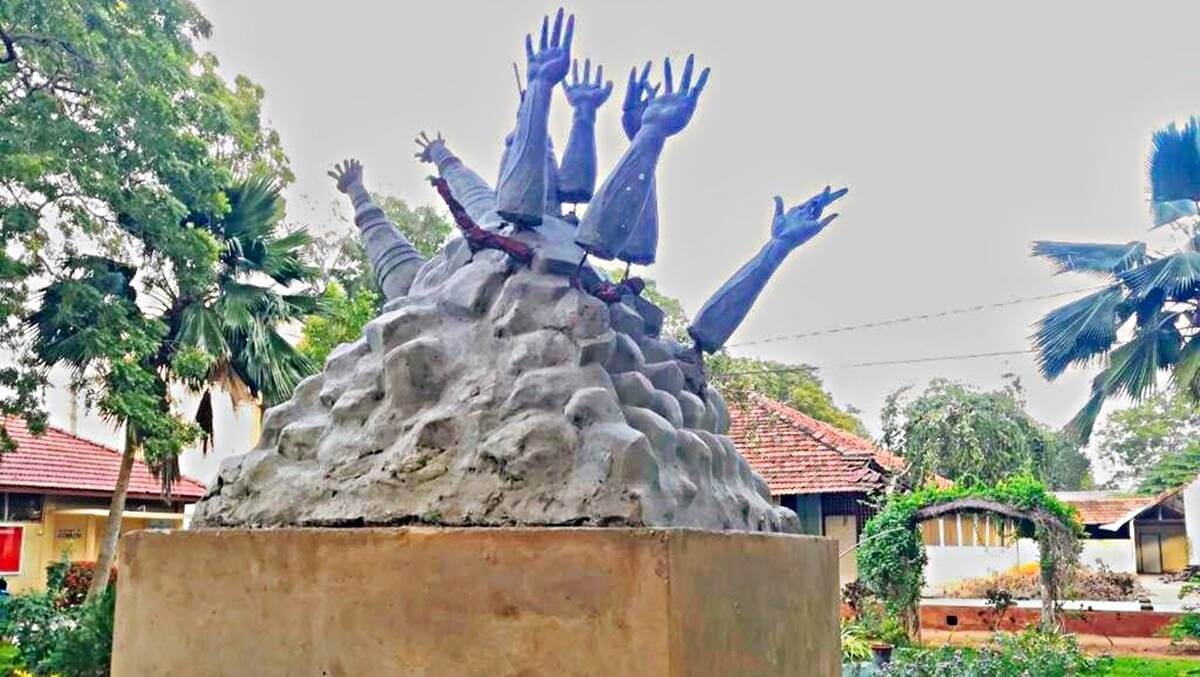On Friday, the Vice-Chancellor of the University of Jaffna, in the Northern Province in Sri Lanka, ordered the destruction of a war memorial, attracting widespread criticism from the Tamil community in the country. The memorial was thereafter brought down on Saturday in the presence of the Army and police forces. Following its destruction, several Tamil groups came out criticising the move as a tool for the Sri Lankan government to deliberately hurt the sentiments of the Tamil minority in the country.
The memorial was constructed in 2019 to commemorate the Tamil lives lost during Sri Lanka’s civil war and the 2009 Mullivaikal massacre. The massacre, which led to the death of around 40,000 members of the Tamil minority community by the Sri Lankan army, has permanently scarred the Northern Province and its residents. This incident marked the end of the brutal three-decade-long civil war between the Sri Lankan armed forces and the Liberation Tigers of Tamil Eelam (LTTE).
Several Sri Lankan lawmakers condoned the destruction of the memorial. S. Sritharan, a Tamil legislator, said, “This is a deliberate provocative act knowing well that memorials are to do with emotions.” This discontent was also echoed by large groups of demonstrators, largely students, who protested against the Vice Chancellor’s decision. The Jaffna University authorities have also been blamed for attempting to “erase” the memories of the atrocities committed against the Tamil community. After facing widespread opposition for his decision, on Monday, the Vice-Chancellor vowed to reconstruct the structure in its original place. He also placed a foundation stone to symbolise his acceptance of the students’ demands.
However, the Sri Lankan authorities continue to defend this action, saying that it was necessary for the interest of peace and unity. According to Sampath Amaratunge, the chairperson of the University Grants Commission, “The vice-chancellor has taken the decision to remove the memorial. The students who are currently in the university were only 9-10 years old when the war ended. We have to protect all children. It is not war memorials we need right now, all we want now are monuments of peace.” Moreover, Sarath Weerasekara, Sri Lanka’s Minister of Public Security, criticised the demonstrators, saying that no one had the right to commemorate “dead terrorists”.
Several Indian leaders have come out condemning the decision too, including the Chief Minister of Tamil Nadu, K. Palaniswami, who said, “It comes as a big shock that the memorial pillar, set up in memory of university students and people killed mercilessly in Mullivaikkal in the final stages of the war in Sri Lanka has been demolished overnight.” Moreover, MK Stalin, the president of the Dravida Munnetra Kazhagam (DMK), urged the central government in India to release an official statement condemning the incident.
In fact, the issue of Tamil reconciliation also featured in the Indian External Affairs Minister S. Jaishnkar’s three-day visit to Sri Lanka, which was concluded on Friday. At a joint press conference with his Sri Lankan counterpart Dinesh Gunawardena, Jaishankar said it was in Sri Lanka’s “own interest” to fulfil the Tamil community’s demands for “equality, justice, peace and dignity within a united Sri Lanka”. Accordingly, he called on the Rajapaksa administration to honour its previous commitments to devolving powers to provincial councils in the Northern and Eastern Provinces, such as policing powers and control over land, through the 13th Amendment to the constitution. Referencing President Gotabaya Rajapaksa’s vision, which is titled ‘Vistas of Prosperity and Splendour’, Jaishankar said that addressing the Tamil community’s concerns would ‘advance’ the “progress and prosperity of Sri Lanka”. To illustrate the Indian government’s commitment to the Tamil community in Sri Lanka, EAM Jaishankar also met with the Tamil National Alliance (TNA) leadership, where he “discussed issues pertaining to development and devolution and the role of Provincial Councils”. He also met with a delegation of the Tamil Progressive Alliance (TPA).
This comes as the Tamil community in Sri Lanka grows increasingly vulnerable to the growing populist sentiments and the Rajapaksa brothers-led government’s decision to pander to this anti-Tamil narrative. Several ministers and the Buddhist clergy has been pressuring the government to revoke the 13th amendment, which establishes the provincial council system – a crucial element of the 1987 India-brokered deal that attempted to bring an end to the ethnic conflict in Sri Lanka. Just last month, Sarath Weerasekara had shunned the 1987 accord with India as “no longer valid.” Moreover, Sri Lanka’s Foreign Secretary Admiral, Jayanath Colombage, has promised that police and land powers will “never” be devolved to the provinces, which is a key element of the 13th Amendment. Several Tamilian activists have also complained about the growing presence of the Sri Lankan army in the Tamil-dominated regions.
Sri Lankan Authorities Destroy Mullivaikkal Memorial in Jaffna, Angering Tamil Community
Following a decision by the Jaffna University Vice-Chancellor, a memorial honouring the Tamil lives lost during Sri Lanka’s civil war and the Mullivaikkal massacre was brought down.
January 11, 2021

SOURCE: TWITTER
